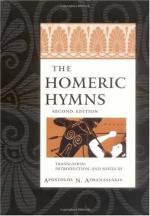Tell me, Muse, concerning the dear son of Hermes, the goat-footed, the twy-horned, the lover of the din of revel, who haunts the wooded dells with dancing nymphs that tread the crests of the steep cliffs, calling upon Pan the pastoral God of the long wild hair. Lord is he of every snowy crest and mountain peak and rocky path. Hither and thither he goes through the thick copses, sometimes being drawn to the still waters, and sometimes faring through the lofty crags he climbs the highest peak whence the flocks are seen below; ever he ranges over the high white hills, and ever among the knolls he chases and slays the wild beasts, the God, with keen eye, and at evening returns piping from the chase, breathing sweet strains on the reeds. In song that bird cannot excel him which, among the leaves of the blossoming springtide, pours forth her plaint and her honey-sweet song. With him then the mountain nymphs, the shrill singers, go wandering with light feet, and sing at the side of the dark water of the well, while the echo moans along the mountain crest, and the God leaps hither and thither, and goes into the midst, with many a step of the dance. On his back he wears the tawny hide of a lynx, and his heart rejoices with shrill songs in the soft meadow where crocus and fragrant hyacinth bloom all mingled amidst the grass. They sing of the blessed Gods and of high Olympus, and above all do they sing of boon Hermes, how he is the fleet herald of all the Gods, and how he came to many-fountained Arcadia, the mother of sheep, where is his Cyllenian demesne, and there he, God as he was, shepherded the fleecy sheep, the thrall of a mortal man; for soft desire had come upon him to wed the fair-haired daughter of Dryops, and the glad nuptials he accomplished, and to Hermes in the hall she bare a dear son. From his birth he was a marvel to behold, goat-footed, twy-horned, a loud speaker, a sweet laugher. Then the nurse leaped up and fled when she saw his wild face and bearded chin. But him did boon Hermes straightway take in his hands and bear, and gladly did he rejoice at heart. Swiftly to the dwellings of the Gods went he, bearing the babe hidden in the thick skins of mountain hares; there sat he down by Zeus and the other Immortals, and showed his child, and all the Immortals were glad at heart, and chiefly the Bacchic Dionysus. Pan they called the babe to name: because he had made glad the hearts of all of them. Hail then to thee, O Prince, I am thy suppliant in song, and I shall be mindful of thee and of another lay.
XIX. TO HEPHAESTUS
Sing, shrill Muse, of Hephaestus renowned in craft, who with grey-eyed Athene taught goodly works to men on earth, even to men that before were wont to dwell in mountain caves like beasts; but now, being instructed in craft by the renowned craftsman Hephaestus, lightly the whole year through they dwell happily in their own homes. Be gracious, Hephaestus, and grant me valour and fortune.




